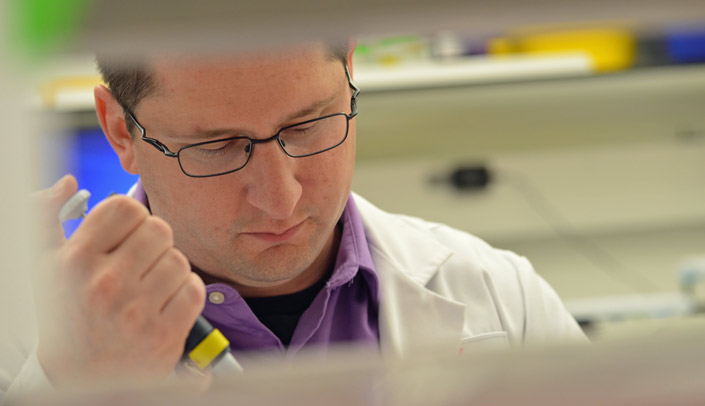Adam Case, Ph.D., is on the pathway to independence.
Dr. Case, a postdoctoral fellow in the lab of Matthew Zimmerman, Ph.D., in the UNMC Department of Cellular and Integrative Physiology, has been awarded an NIH K99/R00 grant, known as the “Pathway to Independence” grant.
Saying thanks
Dr. Case, who also won UNMC’s “Pathway to Independence” Award in 2014, credited his mentors, Dr. Zimmerman and Kaushik Patel, Ph.D., for helping with his career development and his long-term career goals, as well as with the grant submission, a process that took approximately two years with revisions.
“And of course, I have to thank my girlfriend, who is an assistant professor in biomechanics at the University of Nebraska at Omaha, so she understands the grant-seeking process. But it’s never easy for a significant other to be with someone who is a self-diagnosed workaholic and is trying to make it in this field, which is getting tougher and tougher every year.”
He is only the fourth investigator in the state of Nebraska to receive a K99/R00. He received just under $1 million for the five-year grant, which will allow him to explore the role of reactive oxygen species and free radicals, also known as pro-oxidants, in the communication between the brain and the body’s immune system.
“The immune system and the brain are highly linked in cardiovascular disease,” Dr. Case said. “So understanding how those two communicate is essential in understanding that pathway. What’s novel about my research is I’ve found that the brain communicates with the immune system via reactive oxygen species and free radicals.”
Although many people are leery of free radicals, Dr. Case’s research is
beginning to show this may be an overgeneralization.
“In fact, these are really necessary, essential molecules for communication between organ systems and even between cells,” he said. “My research has actually discovered that one way the brain communicates with the immune system is through these free radicals. A major aspect of the project is discovering how that communication affects what genes and proteins are changing inside the cell to signal — but then taking a step back and seeing how this is important in the context of cardiovascular disease.”
In addition to understanding the communication between the brain and the immune system, Dr. Case and his team have found that in stressful events like cardiovascular disease where the brain is overactive, free radicals actually are working to tell the immune system to slow down.
This leads to the practical, clinical application of the project.
“We’ve heard many times that stress is bad for your immune system,” Dr. Case said. “So the idea here is that there may be a way that we can understand how to improve immune function in these diseases where there’s increased stress and brain response.”
Improving immune function in times of increased stress is applicable not only to cardiovascular disease but many other diseases, as well.
“So if we can really pinpoint the mechanisms of that, we could potentially improve immune system function in these patients with other co-morbidity diseases, such as diabetes or stroke,” Dr. Case said.

Adam, congratulations on behalf of the postdoctoral education council. We had no doubt that you would strike big. We wish you the best as you embark on your independent career path.
Hearty congratulations… this is great news
Congratulations, Adam! Your hard work is blowing everyone's hair back! You have always been amazing. Best wishes in your research!